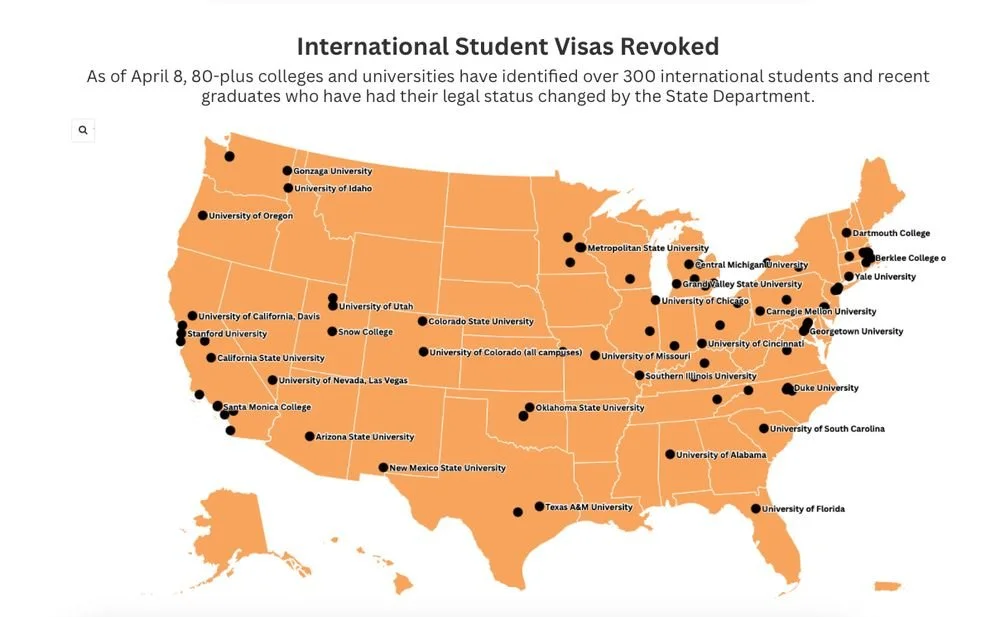U.S. Student Visa Revocations and the Impact on International and Diaspora Students
In recent months, the United States has witnessed a significant and concerning uptick in the revocation of international student visas, an alarming trend often occurring without prior notice being given to the affected individuals. This troubling development has particularly impacted students who are actively involved in campus activism, which has consequently led to widespread uncertainty, confusion, and anxiety among the international and diaspora student communities across various educational institutions. The ramifications of these sudden policy changes have fostered an environment of fear and apprehension that affects not only the students themselves but also the broader academic community.
The Surge in Visa Revocations
Since early 2025, the Trump administration has revoked over 600 student visas, citing reasons ranging from participation in pro-Palestinian protests to minor infractions like traffic violations. Notably, universities such as Texas A&M, the University of Texas, and Ohio State University have reported multiple cases of abrupt visa cancellations.
In many instances, students were not informed of the reasons for their visa revocations, leaving them and their institutions in the dark. Some students discovered their status changes only after being detained or receiving sudden deportation orders .
The "Catch and Revoke" Initiative
A significant factor contributing to these revocations is the State Department's "Catch and Revoke" initiative. This program employs artificial intelligence to monitor international students' social media activity, identifying those deemed to support "pro-Hamas" sentiments. Such assessments have led to visa cancellations based solely on online expressions, raising concerns about freedom of speech and due process
High-Profile Cases Highlighting the Issue
Mahmoud Khalil, a Columbia University student, was detained and faces potential deportation after participating in campus protests. Despite being a lawful U.S. permanent resident, his involvement in activism has been cited as a threat to foreign policy Reuters
Rümeysa Öztürk, a Tufts University Ph.D. student, was arrested without prior notice and accused of supporting Hamas due to her participation in a student newspaper article. Her detention has sparked protests and legal challenges, emphasizing the precarious position of international students engaged in activism Wikipedia
Implications for International and Diaspora Students
The current climate poses several challenges:
Academic Disruption: Sudden visa revocations interrupt studies, research, and academic progress.
Legal Uncertainty: Students often face legal complexities without clear guidance or support.
Emotional and Psychological Strain: The fear of unexpected detention or deportation contributes to stress and anxiety.
Deterrence of Future Applicants: The unpredictability of visa statuses may discourage prospective international students from considering U.S. institutions.
Recommendations for Students and Institutions
For Students:
Stay Informed: Regularly consult with university international offices and legal advisors.
Exercise Caution Online: Be mindful of social media activity, understanding its potential implications.
Know Your Rights: Familiarize yourself with legal rights and available resources in case of visa issues.
For Institutions:
Provide Support Services: Offer legal assistance and counseling for affected students.
Advocate for Students: Engage with policymakers to highlight the adverse effects of abrupt visa revocations.
Enhance Communication: Ensure transparent and timely communication with international students regarding policy changes.
Conclusion
The recent wave of student visa revocations underscores the fragile position of international and diaspora students in the U.S. educational landscape. As policies evolve, it's imperative for students and institutions to remain vigilant, informed, and proactive in navigating these challenges. Organizations like Tukole International are committed to supporting affected students, advocating for fair treatment, and fostering an inclusive academic environment.




